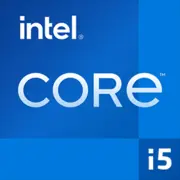Intel Core i5-14400F

The Intel Core i5-14400F processor is a powerful and efficient option for desktop users looking for an upgrade. With a total of 10 cores and 16 threads, this processor is capable of handling heavy workloads and multitasking with ease. The base frequency of 2.5 GHz can be boosted up to 4.7 GHz, providing a significant performance boost when needed.
The 20MB of L3 cache ensures that frequently accessed data is readily available, further improving overall speed and responsiveness. With a TDP of 65W, the i5-14400F strikes a good balance between performance and power efficiency, making it suitable for a wide range of desktop systems.
In terms of real-world performance, the Geekbench 6 scores of 2605 for single-core and 13410 for multi-core tasks demonstrate the impressive capabilities of this processor. Whether you're gaming, video editing, or running demanding software applications, the i5-14400F can handle it all with ease.
Overall, the Intel Core i5-14400F processor is a solid choice for those looking to build or upgrade a desktop system. Its combination of high core count, efficient power usage, and strong performance make it a compelling option for a variety of use cases.
Basic
Label Name
Intel
Platform
Desktop
Launch Date
January 2024
Model Name
?
The Intel processor number is just one of several factors - along with processor brand, system configurations, and system-level benchmarks - to be considered when choosing the right processor for your computing needs.
i5-14400F
Code Name
Raptor Lake Refresh
CPU Specifications
Total Cores
?
Cores is a hardware term that describes the number of independent central processing units in a single computing component (die or chip).
10
Total Threads
?
Where applicable, Intel® Hyper-Threading Technology is only available on Performance-cores.
16
Performance-cores
6
Efficient-cores
4
Performance-core Base Frequency
2.5 GHz
Efficient-core Base Frequency
1.8 GHz
Performance-core Max Turbo Frequency
?
Maximum P-core turbo frequency derived from Intel® Turbo Boost Technology.
4.7 GHz
L1 Cache
80K per core
L2 Cache
2MB per core
L3 Cache
20MB shared
CPU Socket
?
The socket is the component that provides the mechanical and electrical connections between the processor and motherboard.
LGA-1700
Technology
?
Lithography refers to the semiconductor technology used to manufacture an integrated circuit, and is reported in nanometer (nm), indicative of the size of features built on the semiconductor.
Intel 7
TDP
65 W
Max. Operating Temperature
?
Junction Temperature is the maximum temperature allowed at the processor die.
100°C
Memory Specifications
Memory Type
?
Intel® processors come in four different types: Single Channel, Dual Channel, Triple Channel, and Flex Mode. Maximum supported memory speed may be lower when populating multiple DIMMs per channel on products that support multiple memory channels.
DDR5-6000
Max Memory Size
?
Max memory size refers to the maximum memory capacity supported by the processor.
128GB
Memory Channels
?
The number of memory channels refers to the bandwidth operation for real world application.
2
GPU Specifications
Integrated Graphics Model
?
An integrated GPU refers to the graphics core that is integrated into the CPU processor. Leveraging the processor's powerful computational capabilities and intelligent power efficiency management, it delivers outstanding graphics performance and a smooth application experience at a lower power consumption.
No
Benchmarks
Cinebench R23
Single Core
Score
1839
Cinebench R23
Multi Core
Score
18180
Geekbench 6
Single Core
Score
2605
Geekbench 6
Multi Core
Score
13410
Geekbench 5
Single Core
Score
1538
Geekbench 5
Multi Core
Score
10924
Passmark CPU
Single Core
Score
3726
Passmark CPU
Multi Core
Score
25797
Compared to Other CPU
Cinebench R23 Single Core
Cinebench R23 Multi Core
Geekbench 6 Single Core
Geekbench 6 Multi Core
Geekbench 5 Single Core
Geekbench 5 Multi Core
Passmark CPU Single Core
Passmark CPU Multi Core
Share in social media
Or Link To Us
<a href="https://cputronic.com/cpu/intel-core-i5-14400f" target="_blank">Intel Core i5-14400F</a>